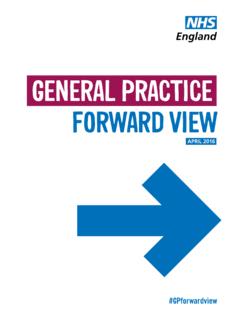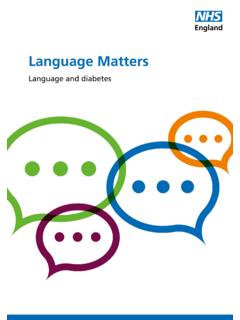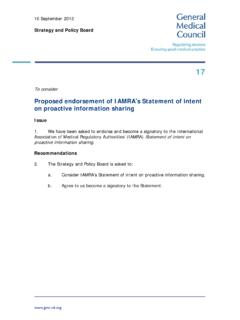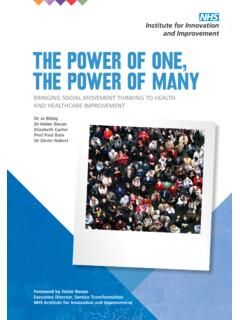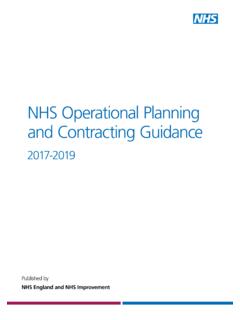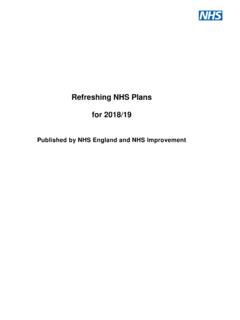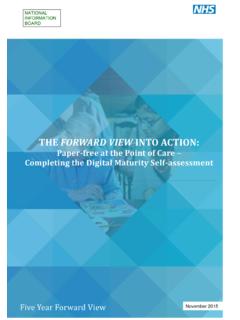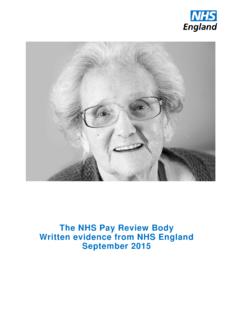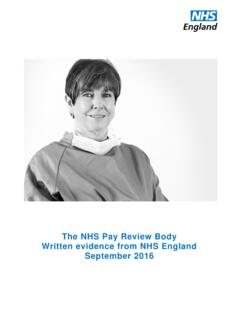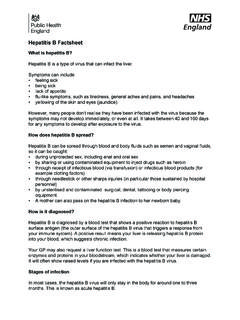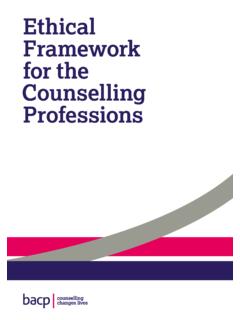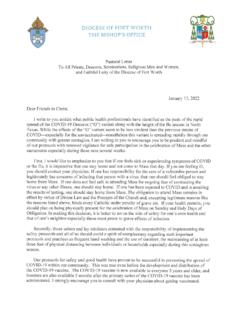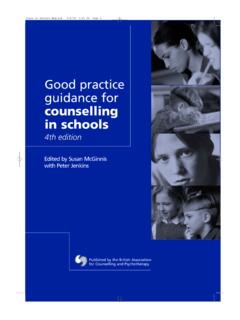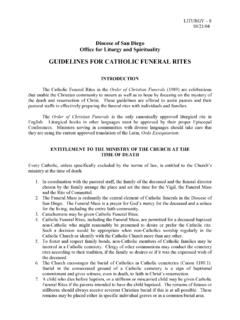Transcription of Promoting Excellence in Pastoral, Spiritual & Religious Care
1 OFFICIAL Page | 1 NHS Chaplaincy guidelines 2015 Promoting Excellence in pastoral , Spiritual & Religious care OFFICIAL Page | 2 NHS England INFORMATION READER BOXD irectorateMedicalCommissioning OperationsPatients and InformationNursingTrans. & Corp. StrategyFinancePublications Gateway Reference:03113 Document PurposeDocument NameAuthorPublication DateTarget AudienceAdditional Circulation ListDescriptionCross ReferenceAction RequiredTiming / Deadlines(if applicable)GuidanceLS2 7UE0113 824 9198 Ruth PassmanCommissioning Strategy: Equality and Health InequalitiesQuarry HouseLeedsThe guidelines replace those published in 2003 and provide a comprehensive description of good practice in chaplaincy care for the NHS in document responds to changes in the NHS, society and the widening understanding of Spiritual , Religious and pastoral care .
2 In the light of the 2010 Equality Act new guidance is provided for the care of patients and service users whatever their religion or belief. The guidelines recognise the development of chaplaincy in a range of specialities including General Practice and in areas such as Paediatrics and Palliative and innovation are affirmed as important areas for chaplaincy both for improved practice and as a basis for commissioners to understand the benefits of chaplaincy- Spiritual implementation of the guidance will improve support for patients, carers, family members, volunteers, and other people accessing NHS services and staff across the health Dr Chris Swift in consultation with the Chaplaincy Leaders Forum (CLF) and the National Equality and Health Inequalities Team, NHS March 2015 CCG Clinical Leaders, CCG Accountable Officers, CSU Managing Directors, care Trust CEs, Foundation Trust CEs , Medical Directors, Directors of PH, Directors of Nursing, Local Authority CEs, Directors of Adult SSs, NHS Trust Board Chairs, NHS England Directors of Commissioning Operations, All NHS England Employees, Directors of HR, Allied Health Professionals, GPs, Communications Leads, Emergency care Leads, Directors of Children's Services, NHS Trust CEsTrade Unions, Higher Education Institutions, Universities, Chaplaincy Associations, Community and Voluntary Sector partners and organisations, Constitution, NHS England 'Putting Patients First'.
3 The NHS England Business Plan for 2013/14 - 2015/16 Replace the 2003 NHS Chaplaincy GuidelinesNANHS England NHS Chaplaincy guidelines 2015: Promoting Excellence in pastoral , Spiritual & Religious CareSuperseded Docs(if applicable)Contact Details for further informationDocument is a controlled document. Whilst this document may be printed, the electronic version posted on the intranet is the controlled copy. Any printed copies of this document are not controlled. As a controlled document, this document should not be saved onto local or network drives but should always be accessed from the intranet OFFICIAL Page | 3 NHS England NHS Chaplaincy guidelines 2015 Promoting Excellence in pastoral , Spiritual & Religious care Version number: 1 First published: 2003 Updated: 6th March 2015 Prepared by: The Revd Dr Chris Swift in consultation with the Chaplaincy Leadership Forum (CLF)* and the National Equality and Health Inequalities Team, NHS England Review table: Name of Review When Who NHS Chaplaincy guidelines Review 18-20th February 2017 Responsible officer for NHS Chaplaincy Programme and the Chaplaincy Leaders Forum NHS Chaplaincy guidelines .
4 Equality Analysis 1st April 2015 27th February 2016 Responsible officer for NHS Chaplaincy Programme and the Chaplaincy Leaders Forum Information Governance: Update and Annex to be developed 1st April 2015 February 2016 Responsible officer for NHS Chaplaincy Programme, Information Governance Lead and the Chaplaincy Leaders Forum Classification: OFFICIAL The NHS Commissioning Board (NHS CB) was established on 1 October 2012 as an executive non-departmental public body. Since 1 April 2013, the NHS Commissioning Board has used the name NHS England for operational purposes. * The Chaplaincy Leaders Forum (CLF) was developed in September 2013 as an effective mechanism for dialogue between NHS England, and the wider chaplaincy associations listed below: College of Health care Chaplains (CHCC) - professional group within Unite Union, with a membership of almost 1000 members.
5 Association of Hospice and Palliative care Chaplains (AHPCC) - professional group supporting and working with people in end of life care . UK Board of Healthcare Chaplains (UKBHC) a professional group which holds a voluntary professional register for chaplains. Health care Chaplaincy Appointment Advisers is a partnership with the leading chaplaincy bodies and the NHS England. The advisers themselves are experienced practitioners covering a range of health care chaplaincy contexts. They have no role in validating the faith or belief position of applicants or candidates for interview but advice employers about their professional suitability. This includes an assessment of applicants against published standards, job evaluations and other documentation relevant to the advertised post. Healthcare Chaplaincy Faith and Belief Group (HCFBG) which includes all 9 world Faith groups and the British Humanist Association attend as observers.
6 OFFICIAL Page | 4 Contents 4 1 Executive summary .. 5 What do we mean by chaplaincy?..6 2 Introduction .. 7 3 Patient and Service User care : equality, safety and compassion .. 9 4 Staff and Organisational Support: informed, competent, critical .. 11 5 Key Components for an Effective Chaplaincy Service .. 12 6 Volunteers in Chaplaincy .. 13 7 Chaplaincy Staffing .. 14 8 Chaplaincy in Acute care .. 16 9 Chaplaincy in Mental Health care .. 18 10 Chaplaincy in General Practice .. 20 11 Chaplaincy in Specialist Palliative care .. 21 12 Chaplaincy in Specialist Paediatric care .. 22 13 Chaplaincy in Community care .. 23 14 Information Governance .. 24 Best practice for providing excellent Spiritual Information and Staff 15 Training, Development & Research .. 25 16 Further Areas of Guidance for Chaplaincy Services.
7 27 Appointing Multi-Faith & Belief Bereavement Major Incident Response (MAJAX)..27 17 Appendix A: .. 28 18 Consultation and Involvement .. 29 OFFICIAL Page | 5 1 Executive summary "At its best, our National Health Service is there when we need it, at the most profound moments in our lives. At the birth of our children. At the deaths of our loved ones. And at every stage in between - as we grapple with hope, fear, loneliness, compassion - some of the most fundamental elements of the human spirit." Simon Stevens Chief Executive, NHS England March 2015 Local NHS trusts are responsible for determining, delivering and funding Religious and Spiritual care in a way that meets the needs of their patients, carers and staff. Norman Lamb, MP, Minister of State for care Services, Department of Health, Commons Written Answers 17 December 2013.
8 These guidelines replace those published in 2003 and provide a comprehensive description of good practice in chaplaincy care for the NHS in England. The document responds to changes in the NHS, society and the widening understanding of Spiritual , Religious and pastoral care . In the light of the 2010 Equality Act new guidance is provided for the care of patients and service users whatever their religion or belief. The guidelines recognise the development of chaplaincy in a range of specialities including General Practice and in areas such as Paediatrics and Palliative care . Research and innovation are affirmed as important areas for chaplaincy both for improved practice and as a basis for commissioners to understand the benefits of chaplaincy- Spiritual care . The guidance draws on evidence from practice to recommend the resources needed for chaplaincy staffing across a range of contexts in the NHS.
9 Implementation of the guidance will improve support for patients, carers, family members, volunteers, and other people accessing NHS services and staff across the health service. It is anticipated that further documents and good practice guides will be developed in partnership with other agencies to elaborate and contextualise these guidelines . For the purposes of this document: Throughout this guidance we have used the term chaplaincy , as it is widely used in the NHS. It is intended to include the pastoral and Spiritual care provided to patients, family and staff, whatever it is called in practice, and to include Religious care provided by and to Religious people. The term chaplain is intended to also refer to non- Religious pastoral and Spiritual care providers who provide care to patients, family and staff Spiritual care is care provided in the context of illness which addresses the expressed Spiritual , pastoral and Religious needs of patients, staff and service users.
10 These needs are likely to include one or more of the following: ways to support recovery issues concerning mortality OFFICIAL Page | 6 Religious convictions, rituals and practices non- Religious convictions and practices relationships of significance a sense of the sacred exploration of beliefs It is important to note that people who do not hold a particular Religious affiliation may still require pastoral support in times of crisis. Religion or belief is as defined in the 2006 Equality Act: (a) religion means any religion, (b) belief means any Religious or philosophical belief, (c) a reference to religion includes a reference to lack of religion, and (d) a reference to belief includes a reference to lack of belief. What do we mean by chaplaincy? Discussions have taken place over the years about the term Chaplaincy , its history and its meaning.
